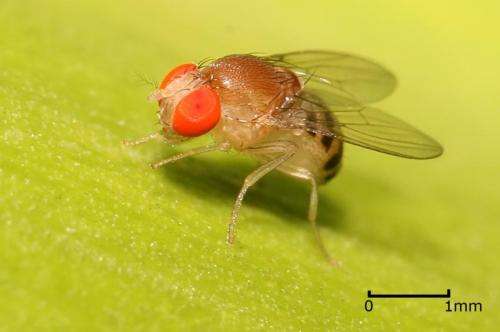February 20, 2019 report
Study shows foraging gene works nearly the same in humans and fruit flies

A team of researchers from Canada, the U.K. and the U.S. has found that a gene known to influence foraging in fruit flies has a similar effect on humans. In their paper published in Proceedings of the National Academy of Sciences, the group describes experiments they carried out with college student volunteers and what they found.
Prior research has shown that forms of a gene called PRKG1, known to have an impact on foraging, are present in a wide variety of animals, including both humans and fruit flies (both of whom have a known history of foraging for food). In humans, the form of the gene is a nucleotide polymorphism genotype called rs13499. Prior research has also shown that one variant of the gene in fruit flies nudges them to be "sitters" and another "rovers." When entering an area with fruit, sitters are likely to first tour the perimeter of the area, then move inward. Rovers, on the other hand, jump right in, going after the first fruit they see. The researchers in this new effort wondered if the same gene in humans might have a similar effect, so they developed experiments to find out.
College volunteers used a touchscreen tablet to find as many berries as possible hidden among fruit plants in a virtual scene. They could navigate around the virtual environment and click on fruit to pick it. Each of the volunteers also gave a tissue sample for DNA testing.
The researchers found that some volunteers took a perimeter-first approach, while others dove right in. In comparing their genes, the researchers found the same variant responsible for instigating sitter behavior in fruit flies also did so in human sitters and likewise for the rovers. The researchers also noted that the search paths taken by the human volunteers and the sitter and rover fruit flies were nearly identical.
The researchers claim their experiments show that distinct search patterns connected to goal pursuit in humans can be associated with PRKG1 variants.
More information: Andriy A. Struk et al. Self-regulation and the foraging gene (PRKG1) in humans, Proceedings of the National Academy of Sciences (2019).
Journal information: Proceedings of the National Academy of Sciences
© 2019 Science X Network

















